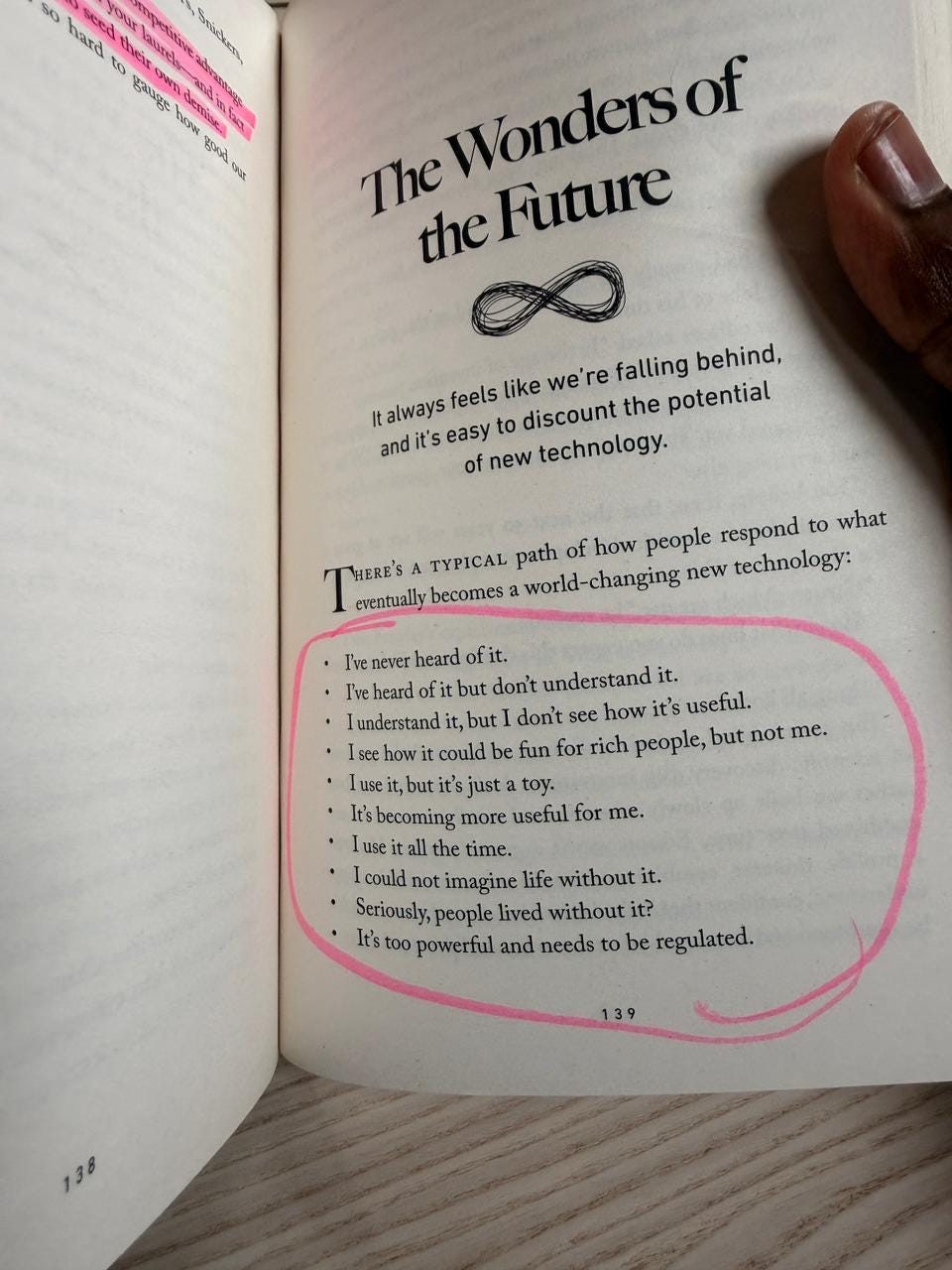"How did you live without the internet?", I asked my dad...
Let me walk you through thought-provoking conversations between three generations.
PS → I published this article previously in 2023 when AI was new, just thought it needed a refresh.
I remember one Sunday, one of those rare miracles where we got back home from church early (only pastors’ kids can relate).
I randomly asked my dad, “How did you guys survive without internet or mobile phones back in the day? Like… if you couldn’t text or call, how did you even communicate?”
Let’s go to the past…
He smiled. That quiet, nostalgic kind of smile that usually means, “sit down, gist dey”.
He took a moment to gather his thoughts as he settled into that brown chair, and then he began to recount his university days.
“Well“, he said, “things were quite different back then. If we wanted to communicate with someone who was far away, we would write letters, put them in envelopes, and then trek to the nearest post office to send them. Then, we would wait for days/weeks for a response to arrive.”
That sounded like ‘cap‘, big cap; like something an arrogant old uncle would say to emphasise that they suffered and we little brats have easier lives.
But it’s not; that was reality.
My curiosity increased, and I asked, “Wasn’t that stressful? There are 200 other things one could do with the time spent trekking up and down to the post office. What if the message was urgent?”
“It will seem stressful to you now, but back then, it was our norm. We didn’t know any different, so we didn’t feel the same sense of urgency that we do today with instant communication. We were patient. We understood that it took time for messages to travel and for people to reply.” He said.
He concluded by saying, “You only feel inconvenienced by a situation if you know there could be a better situation. What you don’t know doesn’t affect you.”.
Let’s come to the present…
Fast-forward a couple of years: Just as I sat behind this desk, I remembered that conversation with my dad and reminisced about the lessons from the story.
I couldn’t help but think about how the internet revolutionised communication and how the rise of AI is changing the landscape of technology and the world as we know it.
It hit me that if we’re in the early days of AI and we’re impressed this much, imagine what AI will be like 10 years from now.
Let’s go to the future…
I imagine a little me (my future child), just back from school in a self-driving car, mannerlessly flinging his backpack on the floor (since the robotic house help will pick it up), excited about how his AI teacher helped him build a moon rocket, and how his school robot principal promised to take the whole class to the moon if they finish their homework on time.
Then he pauses mid-rant and asks: “Big man… how did you guys survive without superintelligent AI? Like… AGI wasn’t helping you in school?”
I take a deep breath, summon my inner dad-mode, and say: “Well, my boy, back in my time, at least in the first three decades of my life, we didn’t ‘really’ have the luxury of advanced AI as we do now. We relied on our knowledge, problem-solving abilities, and manual processes to accomplish tasks. In fact, our teachers were humans.“
Curiosity filled my child’s eyes (since curiosity is in the gene), and he asked, “But didn’t you miss having intelligent robots to make things easier and faster?“
I looked at my child with appreciation for our progress as humans and joy that he had the sense to ask such thought-provoking questions.
Passing down the gem from the conversation with my dad, I concluded with my child by saying, “You don’t miss what you don’t know, just as you are currently not missing something in the future that hasn’t been invented yet. But looking back, the absence of superintelligent AI made us resourceful and encouraged us to develop our critical thinking and problem-solving skills. It taught us the value of perseverance and creativity in finding solutions.“
I imagined my child would think that sounds like what I, an arrogant old man, would say to insinuate that my generation was smarter and theirs could not get simple things done without using AI. So I added, “But that doesn’t take away from the benefits of AI. I mean, why do we need to rack our brains about going to the moon when AI can just transport a bunch of teenagers there for fun?”.
As our conversation continued, I realised that just as I had struggled to comprehend my dad’s experiences without the internet, little me would find it difficult to grasp a world without advanced AI. To him, we are just idiots in this era.
And at that moment, I couldn’t help but feel grateful for living in a time when AI was gradually becoming an integral part of our lives.
Let’s reflect a little…
Reflecting on the past, present, and future, I realised that each era had challenges and breakthroughs. And the challenge of one era creates a breakthrough for the next.
The internet and AI were two monumental milestones in our technological journey, each offering unique benefits and lessons.
The internet wouldn’t exist without ARPANET, a Cold War-era military project meant to help computers gossip securely. Web2 wouldn’t exist without the internet. AI (as we know it today) wouldn’t exist without Web2. And a robotic school principal of the future wouldn’t exist without AI.
And as we continued to advance, I knew that my child, little me, would one day share his own stories with the next generation, marvelling at how they managed to survive without a technology yet to be invented.
Let’s take home some points…
You don’t miss what you don’t know. But once you know, you can’t imagine not knowing.
Today, you might still be wondering what the fuss about AI is. Twenty years from now, your kids might be wondering how you survived in a world where AI wasn’t making all your meals (and they’ll say it while chewing 3D-printed pounded yam, generated by a machine built on GPT-170 model).
I saw this recently in a book, and it said it better than I ever could:
From “I’ve never heard of it” to “Seriously, people lived without it?”, the journey is always the same as ever.
Stay informed.







